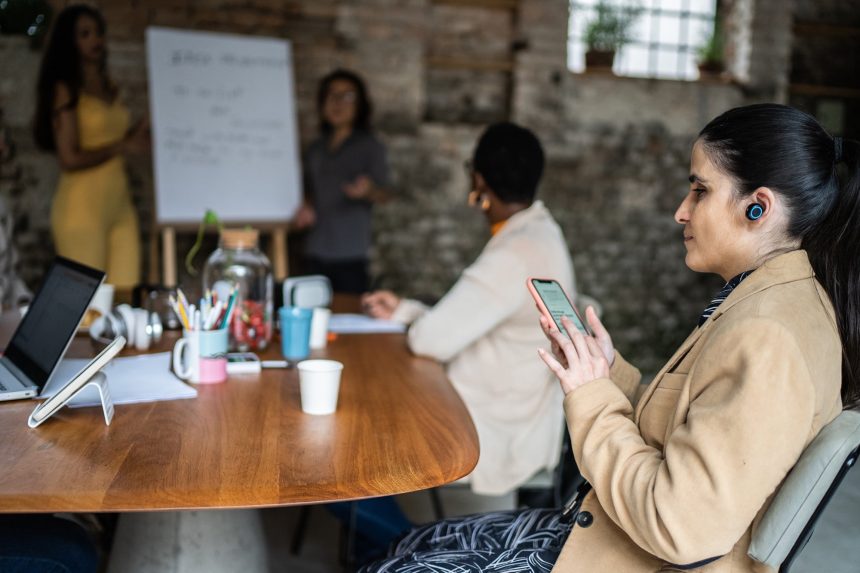If you suffer a limiting condition, such as fading eyesight, mobility issues or total vision loss, technology can be the difference between leading in business and falling behind. Many executives experience common ailments such as farsightedness or broken limbs, temporary setbacks such as recovery from eye surgery or more permanent disabilities like hearing loss or blindness. In these situations, knowledge is power. I wouldn’t be able to run my company without technology.
I was sixteen when the doctor told me I would be blind by forty. A devastating retinitis pigmentosa diagnosis brought a drastic new vision of my future. I knew the disease was progressive, so I had some time to research companies and products supporting people with vision impairments. As I’ve adapted to new tech, I am sharing some tools and in a small way, paying my knowledge forward. Programs have evolved, and I rely on several key software apps and devices to support me in my role as a blind CEO. Here are a few that get me through each day.
Related: What Vision Loss Has Taught Me About Balancing Extremes in Business
Screen enhancement
Computer accessibility solution technology, such as Zoomtext, makes it possible for anyone with vision impairments to use their computer screen, assuming they can still use their mouse as well. Freeware and shareware programs are cheaper, but Zoomtext is more than a screen magnifier.
The screen readability at high zoom levels is made possible by AI Squared technology that eliminates blurry text on freeware programs. With Zoomtext, you also get color-changing and enhancement capabilities. Vision impairment can strike anyone at any time. Looking into screen enhancements before you need them can help preserve your vision, preventing simple eye strain.
Related: 5 Types of Technology All Entrepreneurs Need Access to in the Digital Age
Voice accessibility technology
My partner in running my company is JAWS or Job Access With Speech. Like Zoomtext, JAWS is a screen reader, but the advantage is that it works without a mouse, either with text or Braille. As long as the information is on a Word document or Microsoft Outlook email, JAWS will read it; in fact, JAWS and I get up early in the morning to start reading emails.
The voice access tech allows you to send replies and compose Word documents. There are several levels of service at a variety of price options. Someone with significant vision loss or a legally blind business leader can still bring their heart, mind and talent to corporate teams, keeping communication channels open.
Related: Employers Need Workers. Now They’re Realizing The Untapped Talent of These People.
Tech readers
Be My Eyes provides volunteers who can help visually-impaired persons “see” their environment. You can be connected to a live person who can see through the camera via your phone, assisting with navigating your surroundings or helping you do your work. If you’re having trouble finding a suite number or rooms at a conference, they can help. As a legally blind person, I might need help crossing a street, especially if my guide dog, Frost, can’t go with me someplace.
AIRA, a paid service, can pull up a GPS map to pinpoint your location to help in navigation. AIRA uses screenshare; a remote person can take control of your computer to help do things directly, such as conducting research or filling out online forms. Tech readers can reveal what a piece of mail says, what a sign says, or read a document. Be My Eyes is developing a virtual assistant via the new Chat GPT4 language model. Both tech readers can help the visually impaired and business leaders with broken limbs or fingers to keep the recovery period productive.
Orcam is about two inches in length, and it is tied to your sunglasses. After it magnetizes to the glasses, you can tap the Orcam, and it will take a picture of what you’re looking at, reading out everything it sees, from items on a shelf to the pages of a book; all ages can use it. Orcam can read bills as well as what’s being shown on TV. This is especially important if the announcer says, “Call the number on your screen,” without reading the digits. Now, you won’t miss out on infomercial purchases.
Another tool, Cashreader, works with the iPhone camera. You can put any dollar bill up to the camera, and Cashreader will tell you the denomination. The tool reads not only dollars but all foreign currency.
If you’re traveling, you now have options to get quick visual support, and on days you work long hours, you can lean on these tools to help you complete projects, work seamlessly in multiple locations, and always feel in charge of your environment.
Labeling
I invested recently in barcode labels and ID Mate; the latest version is I.D. Mate Galaxy. I can’t see the contents of closets and storage areas in my workplace. Something as simple as finding a file in a cabinet is a breeze with I.D. Mate. The barcode system takes a bit of time investment: You can have an assistant record the contents of storage bins, filing cabinets, boxes of documents, etc.
All you do is point a reader at the barcode, and you will hear your assistant’s voice reading the information you need. This tech makes organizing your life a reality. You can now keep track of model and serial numbers on hardware or other information in fine print on machinery, equipment or containers. Barcoding and labeling save time, taking the mystery out of finding the things you need when you need them.
Related: 5 Ways ChatGPT Is Empowering People with Disabilities
Always new tools to try
Companies and university engineers are developing new tools daily to help disabled persons to do things they couldn’t do before. There is technology to help quadriplegic people use their cell phones, response-to-text tools for people who are deaf or hard of hearing, and tech to help wheelchair users find accommodating facilities.
Universities are embracing assistive tech on campuses across the country. Hundreds of technology aids and new products come out every day, designed to help you get through each day’s challenges. Anyone injured or dealing with low mobility, vision loss, or hearing impairment can work smarter; you can run your company, keeping the flow of work moving forward. If you’re open to new technology, you can emerge from the learning curve with a new sense of freedom that allows you to take charge of every area of your life.
Read the full article here










